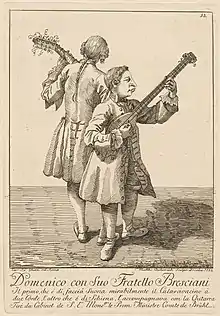_(17813391984).jpg.webp) Colascione (right) | |
| String instrument | |
|---|---|
| Other names | Colachon |
| Classification | Plucked |
| Developed | Italy, Renaissance |
The colascione (or calascione, Italian: [kolaˈʃʃoːne], French: colachon [kɔlaˈʃɔ̃], also sometimes known as liuto della giraffa meaning giraffe-lute, a reference to its long neck) is a plucked string instrument from the late Renaissance and early Baroque periods,[1][2][3] with a lute-like resonant body and a very long neck. It was mainly used in southern Italy. It has two or three strings tuned in fifths.
Noteworthy are the great similarities of the colascione with instruments such as the dutar or the saz. Nevertheless, there are important differences, such as the bridge being on the top of the body.
 Image of Colascione from woodcut from Deutsche Fotothek
Image of Colascione from woodcut from Deutsche Fotothek A modern reconstruction
A modern reconstruction Domenico Colla and his brother, who toured Europe in the 1760s, playing both colascione and colascioncino.
Domenico Colla and his brother, who toured Europe in the 1760s, playing both colascione and colascioncino. Colascione in an illustration from France, 1616.
Colascione in an illustration from France, 1616.
Colascioncino
A smaller version of the instrument existed, called the colascioncino, with string length 50–60 centimeters.[4] The string length for the colascione was 100–130 centimeters.[4] Domenico Colla toured Europe with his brother in the 1760s, playing both colascione and colascioncino.
In the literature of colascione, it is often confused with calichon, a bass version of the mandora.
References
- ↑ Curt Sachs: Handbuch der Musikinstrumentenkunde. Breitkopf und Härtel, Wiesbaden 1979, S. 227f.
- ↑ Curt Sachs: Real-Lexikon der Musikinstrumente, zugleich ein Polyglossar für das gesamte Instrumentengebiet (1913)
- ↑ Anthony Baines: Lexikon der Musikinstrumente. J.B. Metzler'sche Verlagsbuchhandlung, Stuttgart 2005, S. 66
- 1 2 Downing, John. In Search of the Colascione or Neapolitan Tiorba. – a Missing Link? (PDF) (Thesis). pp. 1, 9, 10. Docket FoMRHI Comm. 2027. Retrieved 10 June 2019.